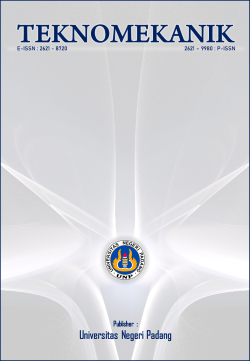Effectiveness E-modul based on project-based learning on visual programming courses
DOI:
https://doi.org/10.24036/jptk.v3i2.7523Keywords:
Validity, E-Modules, Project Based Learning, Visual ProgrammingAbstract
This research aimed to analyze the effectiveness of e-modules based on Project Based Learning on Visual Programming. This research uses the Research and Development (R&D) method and the Instructional Development Institute (IDI) model. The research sample were students who were divided into the experimental class and the control class in the Visual Programming. Data analysis was obtained from the results of the posttest and then an analysis was carried out in the form of normality test, homogeneity test and t test. The results of the tests conducted in the control class consisting of 17 students obtained posttest results with an average value of 81.67% and the results of tests conducted in the experimental class consisting of 16 students get the results of the test with an average score of 86 , 54%. Based on prerequisite tests, data analysis, normal, homogeneous experimental research and the use of e-modules this results in significant differences between the control and experimental classes. Based on the results of the posttest and data analysis prerequisite test, it can be concluded that the e-module based on Project Based Learning that is used has been effective.
Downloads
References
Arkiang, W.P., Sutanta, E., & Nurnawati, E.K. (2014) ‘Aplikasi Sistem Informasi Lokasi Hotel Berbintang di Yogyakarta Berbasis Web. Jurnal Script, 2(1).
Arumsari, N. A. (2014) Pengaruh Reminiscence Therapy Terhadap Tingkat Stres Pada Lansia di PSTW Unit Budi Luhur, Kasongan, Bantul, Yogyakarta. Universitas Muhammadiyah Yogyakarta.
Brockmann, M., Clarke, L., & Winch, C. (2008) 'Knowledge, Skills, Competence: European Divergences In Vocational Education And Training (VET)'—The English, German And Dutch Cases. Oxford review of education, 34(5), 547-567.
Chasanah, Y., Rohman, F. and Zubaidah, S. (2019) ‘Efektivitas Modul Keanekaragaman Hayati Berbasis Project Based Learning dalam Upaya Peningkatkan Hasil Belajar Kognitif Siswa SMA’, Jurnal Pendidikan: Teori, Penelitian dan Pengembangan, 4(4), pp. 531–536.
Forster, A. G., & Bol, T. (2018) 'Vocational Education And Employment Over The Life Course Using A New Measure Of Occupational Specificity'. Social Science Research, 70, 176-197.
Grabowski, S (2003) Teaching & Media: A Systematic Approach. The Gerlach & Ely Model.
Laili, I. (2019) ‘Efektivitas Pengembangan E-Modul Project Based Learning Pada Mata Pelajaran Instalasi’, Jurnal Ilmiah Pendidikan Dan Pembelajaran, 3(3), Pp. 306–315.
Santi, T. K. (2011) ‘Pembelajaran Berbasis Proyek (Project Based Learning) Untuk Meningkatkan Pemahaman Mata Kuliah Fisiologi Tumbuhan’, Jurnal Ilmiah PROGRESSIF, 7(21), 74-83.
Santyasa, I. W. (2009) Metode Penelitian Pengembangan dan Teori Pengembangan Modul. Presented at the Training Seminar for Kindergarten, Elementary, High School, and Vocational School Teachers (pp. 50-60).
Saputra, R. (2014) Perbedaan Hasil Belajar Siswa Menggunakan Model Pembelajaran Berbasis Proyek dengan Model Pembelajaran Drill and Practice pada Mata Diklat MILPBS di SMKN 2 Lubuk Basung.
Sugiyono (2016) Metode Penelitian Kuantitatif, Kualitatif, dan R&D. Bandung: Alfabeta.
Tjandrawinata, R. R. (2016) ‘Industri 4.0: Revolusi Industri Abad ini dan Pengaruhnya pada Bidang Kesehatan dan Bioteknologi’, Working Paper from Dexa Medica Group, (February), pp. 1-12. Doi: 10.5281/zenodo.49404.
Downloads
Published
How to Cite
Issue
Section
License
Copyright (c) 2020 Putri Irma Delianti, Nizwardi Jalinus

This work is licensed under a Creative Commons Attribution 4.0 International License.





